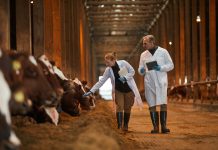Organisations call on World Bank to end ‘chronic underinvestment’ in animal health using new fund launched at this year’s G20 Summit
Members and supporters of the Action for Animal Health coalition have published an open letter urging the World Bank to include provisions for animal health services within its G20 Summit-backed Pandemic Fund.
The fund was launched on Sunday, 13 November, to coincide with this year’s G20 Bali Summit.
The G20 summit will see global leaders discuss pandemic prevention, preparedness and response measures.
The fund looks to address the gaping weaknesses that the COVID-19 pandemic exposed. It is hoped the open letter will prompt proper investment into animal health.
Who signed the open letter?
Signatories of the letter include:
- Brooke
- Four Paws
- The Preventing Pandemics at the Source secretariat
- Vétérinaires Sans Frontières International (VSF)
The fund must look beyond surveillance
VSF state that the fund must look beyond surveillance and ensure that there is an investment in the strengthening of all health systems.
75% of new or emerging diseases come from animals
It may come as a shock, but an estimated 60% of known infectious diseases and up to 75% of new or emerging infectious diseases come from animals.
In light of the COVID-19 pandemic, which originated at the Wuhan wet market via racoon dogs and foxes, it has never been more pressing to address the issue of animal health and welfare.
As the letter concludes,
“The World Bank’s Pandemic Fund will only truly support preventing future pandemics if it invests in the strengthening of all health systems from the ground upwards.”
Open letter to the World Bank Pandemic Fund Governing Board
Dear board members
As members and supporters of the Action for Animal Health coalition, we welcome the launch of the World Bank’s new Pandemic Fund during this year’s G20 Summit in Bali. As the world seeks to recover from the devastating impacts of Covid-19, world leaders have a real opportunity to learn from previous mistakes and shift to pandemic prevention to protect all. The World Bank’s fund could be the watershed moment we need.
The fund must look beyond surveillance and ensure that there is investment in the strengthening of all health systems. The World Bank’s own report, Putting Pandemics Behind Us, argues that prevention is better than cure, imploring leaders to take a One Health approach to address pandemic risk at the source.
Chronic underinvestment in animal health systems leaves us at risk of future pandemics. It has led to critical shortages in animal health workforces, reduced access to medicines and vaccines, and poor animal welfare in parts of the world. For example, in Ghana there are around 950 animal health workers, despite demand requiring around 8500 (Veterinary Services Department, 2021). Such gaps in resources and knowledge leave animals and humans at risk, as the pace of outbreaks accelerates (World Bank 2022).
Earlier this year, we were pleased to share our recommendations for the fund with the World Bank. Whilst we welcome moves from the fund to ensure representation of experts in One Health on the technical advisory board, our position remains clear; funds must be allocated to build strong animal health services.
Humans, animals and the environment are all connected. The World Bank’s Pandemic Fund will only truly support preventing future pandemics if it invests in the strengthening of all health systems from the ground upwards.
Action for Animal Health (A4AH) advocates for more investment in strong and resilient animal health systems that protect people, animals and the planet. It is a coalition of partners – multilateral organisations, NGOs, research institutes and others with expertise in animal health, human health, environmental health and related fields. Partners include Brooke, Global Alliance for Rabies Control and VSF International.










